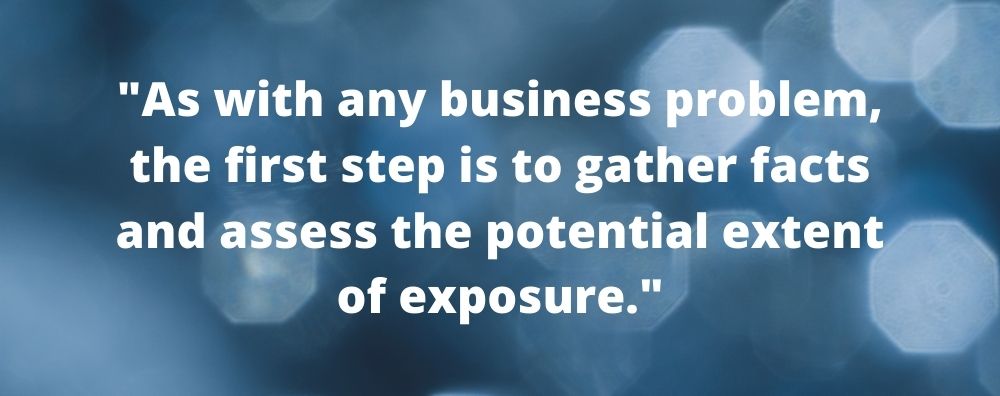by Matt Wheeler, CPA
It is clear to many that COVID-19 has caused us to redefine where and how we work. While many of the trends toward remote work were in place prior to this year, the pandemic has massively accelerated them. There have been many positives as workers and employers everywhere see benefits in decreased commute times, increased flexibility, reduced costs, and so on. On the other hand, new problems await the unwary.
SOUTH DAKOTA V. WAYFAIR, INC.
The state tax landscape has always been confusing and convoluted. Over the years, states have naturally become more aggressive in expanding their tax base and adapting to changes in how goods and serviced are produced, delivered, and consumed. But in 2018, the Supreme Court decided South Dakota v. Wayfair, Inc., ushering in a new era of state tax changes impacting businesses in all 50 states. The Wayfair case substantially broadened the reach of states and now necessitates that companies analyze and determine whether they have nexus—a connection or link to—any given state and whether this connection is sufficient to cause the company to be liable for sales, use, payroll, income, or franchise taxes in that state or locality.
DEFINING NEXUS
For years, Public Law 86-272 was the gold standard for state tax nexus and exposure. Companies were generally not subject to taxation by a given state unless there was substantial, often physical, nexus to a state via a business establishment or employees. As the nature of how goods and services are delivered has changed over the years, and with the meteoric rise in internet-based sales and transactions, many states have now adopted economic nexus thresholds based on the Wayfair case. These states now assert that a business’ nexus or connection to that state is based on the level of economic activity, via sales of tangible property or provision of services, in that state. Physical presence is no longer required.

COVID ERA COMPLICATIONS
These trends have existed since 2018, but COVID has now ushered in new wrinkles and accelerated many of these changes. Employees have dispersed across the nation and an employer that was formerly limited to a single office in a single state may now have employees scattered across two, three, four, or more different states. This diaspora of employees has significant state tax consequences, not only to the employees themselves, but also the business. Payroll tax, benefits, sales and use taxes, and income and franchise taxes may all be impacted by these moves. Owners of pass-through entities may find themselves now being forced to file and pay tax in multiple jurisdictions. Businesses may be required to register to do business in various states, and failure to do so may result in contractual and legal problems when they discover their “right” to do business has been revoked for failure to properly register and file the various annual returns and reports required. Additionally, companies may find themselves in the unenviable position of owing sales or use taxes on sales made to customers where no sales or use tax was originally collected as is required, affecting profit margins substantially.
DUE DILIGENCE
As with any business problem, the first step is to gather facts and assess the potential extent of exposure. This is even more important for business owners who intend to exit or sell their business in the next several years. Buyers in M&A transactions are increasingly requesting warranties and representations surrounding state tax compliance efforts, and this can become a significant part of the due diligence process in a transaction. Given the impact COVID-19 has had on the national and state economies, we expect states to continue aggressively targeting any potential revenue shortfalls to help repair massive budget deficits and expanding their tax base through policies such as taxation of services.

STRATEGY MATTERS
Despite these trends, all is not lost. Many states offer voluntary disclosure programs giving businesses a chance to “come clean” with limited lookback periods and substantially reduced, or eliminated, interest and penalty regimes. Developing a proper strategy on how to tackle these issues, including determining priority and timing, are essential to minimizing overall exposure and reducing the cost of compliance.
WE CAN HELP
Other than highly localized businesses, most businesses will encounter these issues at some point in their life cycle, or currently have unknown exposure because of the remote workforce issues discussed above. Our firm can assist you in analyzing and quantifying your state tax exposure, preparing and entering into voluntary disclosure agreements with states to get back into compliance, and developing a game plan for staying compliant moving forward. If you are interested in learning more about how your business may be impacted by these changes, or would like to learn more about some of the specific issues discussed in this article, you may reach us by using the contact form on our website or following us on social media.
Matt Wheeler, CPA is the Managing Partner of Wheeler Accountants LLP, a full service accounting firm located in the heart of Silicon Valley. Matt works primarily with individuals on comprehensive tax strategies, specializing in equity compensation, serial entrepreneurs, venture capitalists and ultra high net worth individuals. He is also the co-host of the Avocado Toast Podcast – a Podcast targeting HENRYs (high earner not right yet) and millennials helping them make smart financial decisions.
